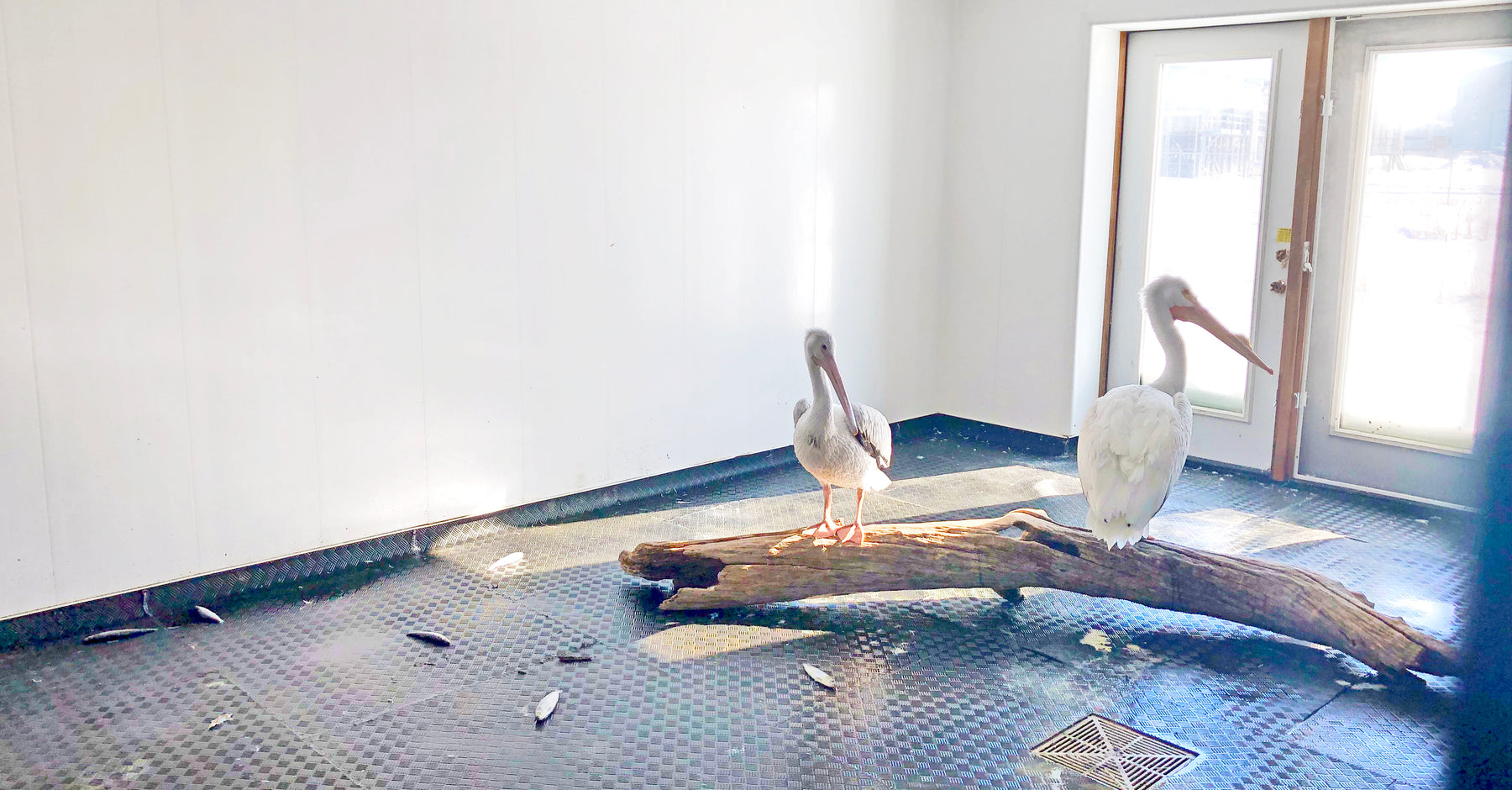
A Community's effort to save the Pelicans
He was on the radar of the community of Lockport as everyone was concerned for his wellbeing. This pelican had not joined the rest of the flock when they left the Red River area and migrated South in early September. He could be seen swimming and bobbing against the waves in the area of open water on an otherwise frozen river near the locks at Lockport. No obvious injury could be seen but he was likely unable to fly. The pelican faced the real danger of developing frostbite as the temperatures started to plummet and this was only November. The weather was going to get worse. Somehow, he needed a rescue or he was likely to die from exposure.
Members of Sustainable Development in Selkirk had been alerted by the public and had this pelican under surveillance for several weeks, trying to make a plan for capture. They often observed him from across the river with binoculars and were able to determine that at night he made his way to the opposite bank and slept on the shore. No matter how stealthily anyone tried to approach him during this time, he quickly would slip into the river which had a very strong current and was dangerous. Sustainable Development did not want to put any of their members in danger, but they also realized that regular citizens had become so emotionally involved that they may risk their safety to save him. This situation was also under their radar.
We also became involved because we were getting many calls from concerned citizens who wanted our assistance in rescuing the bird. We made regular visits to the area, hoping to find the pelican on shore but he was very elusive and we were unable to get close to him. Coordinating with local Conservation Officers on some occasions still did not yield any success.
The pelican became part of the community to the point that people fishing in the area would leave their catch for him on shore and others had brought straw and built a nest for him to keep warm. He had almost everything he needed with that nest and fresh fish, as well as all the fish he was able to catch on his own. But we worried he would not make it through the winter as his body and especially feet were not designed to withstand Manitoba’s harsh climate. We needed to continue our efforts for capture.
Sustainable Development even purchased a weighted throw net that they practised with in order to throw accurately. Hours were even dedicated to staking out the area, laying in wait with the net, hoping to catch him as he made his way on shore, but to no avail.
Late one night, during a blizzard at the end of December, I was notified that citizens had managed to capture the pelican and were on their way to the Wildlife Haven with it. Knowing that there was no one there to receive it, I drove out to meet them. I managed to get to the parking lot of the WH and waded through the snow to meet the two sisters who excitedly shared their story of capture.
That evening, they had gone to drop off some fresh fish they had caught for the pelican and were surprised to find him cuddled up in his nest on shore with his head covered by a wing. They knew this was their chance to catch him but, they didn’t have anything to throw over him for capture. One of the sisters removed her jacket and literally jumped from the bank of the river down to the pelican below, landing on top with her jacket holding him down. She was able to wrap her arms around him securely with his head covered and staggered up the bank to her vehicle where they shoved him inside the small hatchback of her car and carefully drove out to Ile des Chênes in a blinding blizzard.
We moved him out of her hatchback into a kennel and brought him inside the Centre. My first concern was that he had suffered frostbite in his feet or legs but thankfully they were not black and looked healthy and brightly coloured. He was obviously not starving and that was thanks to all the people who had fished for him.
He was able to join another younger pelican we had in care that had been found in the middle of a farmer’s field in late September all alone. He had been weak and malnourished and we assumed he had tried to migrate with his flock but didn’t have the strength to continue and had to land.
Pelicans are very social birds who live in flocks and our young one had been depressed and lethargic all alone in his enclosure. His only solace was standing in front of the large mirror and thinking he had company. After a few days of fussing, these two eventually found comfort in each other’s company.
Normally we are unable to winter pelicans that have failed at migration due to illness or injury. We do not have the proper enclosure and the one time we had a pelican over winter, we had to make arrangements with the Winnipeg Zoo to house him until release in the spring.
We were so very near to moving into our new facility with the indoor waterfowl enclosure, we endeavoured to make the pelicans as comfortable as possible until we could transfer them. We had a heater in their insulated enclosure and a heat lamp along with blankets bunched up for nesting. We had a large pool that we filled with fresh water every day, but it was difficult to keep it from freezing. Their fish was put into the pool and they managed to scoop them out of the water to eat. They were very specific about what kind of fish they would eat. In the wild, they could eat larger fish, simply because they were alive and the motions the fish made when caught aided the pelicans in swallowing them. Dead fish had to be small and so they preferred smelt which were expensive; especially when they were each eating 1 kg a day!
Thankfully, it wasn’t long and our pelicans were the first patients to reside in our new centre’s indoor waterfowl enclosure. It was a large area with a deep pool for them to swim and eat their fish from. There were windows so they got natural sunlight and lots of area for them to explore! It was like an entirely different habitat as soon as you walked from the cold Manitoba winter into the geothermal heated building, and the pelicans thrived! Now our energy turned to raise money to feed them.
We decided to organize an Ice-Fishing Derby! When the Pelican Ice-Fishing Derby was announced many of the citizens of Lockport who were originally involved with the stranded pelican were the first entrants in our derby! It was a huge success as it not only raised money for fish, it brought members of the community together to learn more about the Wildlife Haven Rehabilitation Centre and gave them an opportunity to meet some of our ambassadors. We had over 100 entrants and the river in the Lockport area was covered in ice fishing shacks on a very cold January day - all to support our pelicans! Many fish were caught and numerous dedicated volunteers were involved in organizing this event. It took a large team to organize the registration, measure all the fish caught, serve hot chili lunch and award prizes. It was very fitting that this all occurred right on the river beside Lockport where our pelican had been rescued!

Even Manitoba Fisheries in Gimli heard about our pelicans and how they needed fish to last the winter. Normally, when local commercial fishers pull their nets up, they throw off unwanted fish and leave them on the ice for animals and birds to eat. Instead, they gathered the smaller fish into huge plastic bins and delivered them to the Fisheries head office in Gimli. I then collected the fish to feed our pelicans. Our eagles also enjoyed fish over the winter. The community involvement showed us all that it takes a village to sustain this kind of commitment.
On a warm spring day in April, when we knew for sure that wintering flocks of pelicans had returned to Lockport to start the spring breeding season, we transported our two pelicans back to the river. Watching them hop out of their crate and survey the water rushing by, and the many other pelicans flying and swimming nearby, you could almost see the excitement flickering through their bodies. They stretched their wings and then off they flew to join the rest of the flock. It was breathtaking! We all stood there for several minutes watching them swim up to other pelicans and seemingly converse in joyous reunion. That sense of gratitude and satisfaction has to be shared by all of the people who were instrumental in making this happen. Thank you to the citizens of Lockport, Sustainable Development, Manitoba Fisheries, the sisters, our volunteers and staff. Together we can accomplish miracles!
